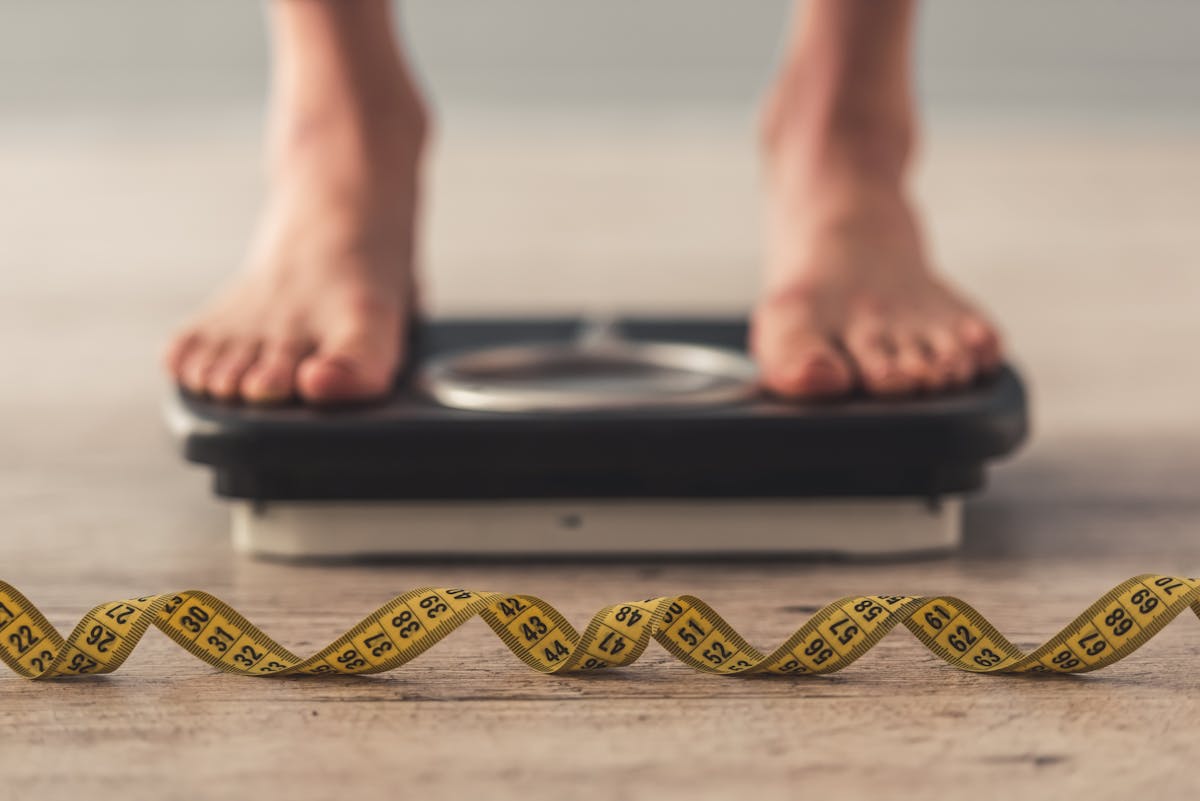Why low carb can help you lose weight
Are you counting calories, avoiding fatty foods, and exercising every day, but your scale is so stuck on the same number, you’re sure it must be broken? If you’ve been doing everything “right,” maybe it’s your diet — and not your scale — that needs a fix.Fortunately, there’s a way to lose weight that’s effective, sustainable, healthy, and even enjoyable: low carb.
Here, at Diet Doctor, one of our goals is to offer you guidance about health and nutrition issues that may seem confusing. We strive to make this guidance trustworthy by backing it with evidence — and by explaining the evidence in ways that are easy to understand.
Read on to learn why following a low-carb diet can help you lose weight.
1. What is a low-carb diet?
Carbohydrates are one of the three major nutrients found in food. Unlike protein and fat, which have other functions, their only role is providing energy for your body.
Low-carb diets — true to their name — contain very few carbohydrates (also known as carbs), which are mostly found in sugary and starchy foods. These diets also provide adequate protein and more fat than a low-fat diet.
You’ve likely heard about the keto diet, which has exploded in popularity over the past few years. But that term is really only meant for the strictest form of a low-carb diet.
Hearing about other people and celebrities losing weight on low-carb diets might make them sound like they’re just the latest fad, but there’s a lot more to these diets than that.
2. Calories vs. carbs: What should I be counting?
To lose weight, you need to eat fewer calories than your body requires. True or false?
This statement is, in fact, true. Please don’t shoot the messenger, though. Just because calories count, doesn’t mean you have to count them! As we’ll discuss, the way your body regulates its weight isn’t as simple as adding and subtracting calories.
Calories are units of energy that allow your body to move, breathe, and go about your daily life. If you consume more calories than you burn, the excess energy will be stored as body fat. When you take in fewer calories than needed, your body will release some of its body fat stores to be used as energy. That’s the whole point of dieting, right?
Yet trying to create a calorie deficit by intentionally restricting how much you eat often fails to achieve lasting weight loss. For one thing, it’s usually very hard to do long term.1 In fact, it may even contribute to weight gain over time, defeating the purpose of counting calories in the first place.2
It’s become increasingly clear there are many different things that influence how much we eat and whether the calories we consume are burned or stored. And one of those things is dietary carbohydrate.
The not-so-secret trick is that reducing carb intake can trigger several changes in your body that may help it to burn more energy than it stores.
3. Eat less without counting calories? How does that work?
Rather than turning every meal into a math equation, carb restriction can help you automatically eat less without counting calories, in or out. Here’s why:
Appetite suppression
Low-carb diets have a long and well-deserved reputation for decreasing appetite. Back in the 1950s, physician A.W. Pennington demonstrated that keeping carb intake very low allowed overweight people to lose weight without going hungry or having to think about calorie restriction.3
How does this work? Lack of hunger when eating low carb has been linked to ketosis, a metabolic state in which your body runs mainly on fat — at least some of which is body fat — and breakdown products of fat called ketones. Studies clearly show that these diets reduce hunger, though the mechanisms via which ketones reduce hunger are only partly understood.4
Although researchers are still learning why low-carb diets reduce hunger, we do know that it’s partly related to the effects of dietary protein and fat on the complex interplay between gut hormones and the brain.
Said more simply, low-carb diets higher in protein, fat, and fiber-filled veggies increase “fullness” hormones, like CCK and PYY, and decrease “hunger” hormones, like ghrelin.5 These effects make it much easier to eat less without actually trying to eat less.
For example, in a small study, 10 adults with obesity and type 2 diabetes, who followed a non-calorie-restricted, very-low-carb diet, ended up reducing their usual intake by 1,000 calories/day, on average — even though they were allowed all the fat- and protein-filled foods they wanted.6
Fewer “empty” calories
Unlike essential fatty acids in fat and essential amino acids in protein, there are no “essential” components in carbs.7 Carbs are the decorative throw pillows of food: fun to have, but unnecessary for health.
Although they provide energy, the nutritional profiles of grains and many other foods that are high in carbs aren’t uniquely impressive. But when you don’t get enough essential nutrition, especially protein, your body may keep you reaching for more food in an attempt to satisfy those needs.8
By contrast, when you eat mainly fish, eggs, cheese, and other high-quality, high-protein foods, you are more likely to end up meeting those essential nutrient needs more easily and with fewer calories.
Reduced food reward
For many people, eating sweets and other refined carbs in processed foods can light up reward centers in the brain. This response can then lead to cravings, which can make it difficult to eat “just one” of anything sugary or starchy.9
But just because a low-carb diet may reduce “food reward” cravings doesn’t mean you can’t eat food that rewards you in other ways! This way of eating includes many tasty, satisfying low-carb foods — while avoiding those that are known to overactivate this food reward system.
Additionally, eating nourishing low-carb meals may help you to feel pleasantly full and ready to move on when you’re done, rather than wanting “just one more bite” (and maybe a nap afterward).
4. Burning more calories without extra exercise
Although controversial and not yet accepted as settled science by all experts, there is some high-quality research suggesting that low-carb diets can help you burn more calories. This might help you maintain lost weight.
After losing weight, many people experience a decrease in their metabolic rate.10 Unfortunately, as unfair as it seems, the human body may not be designed to lose weight.
In fact, your body may think it’s in the middle of a great famine (despite passing 24-hour fast food joints every few miles!) and, as a result, it may deliberately slow down your metabolism in order to use less fuel until it senses that the famine is over.
The end result is that you have to eat even fewer calories to maintain your new weight. Yes, it’s completely unfair!
But don’t despair. There’s some interesting research suggesting that this metabolic slow-down can be minimized with low-carb eating.
Two insightful low-carb studies
In a 2012 study, 21 adults, who’d lost weight on a calorie-restricted diet, were found to burn more calories during weight maintenance if they followed a low-carb diet compared to a low-fat diet — an average of around 300 calories per day more, in fact.11 This finding has been referred to as low carb’s “metabolic advantage.”
According to Professor David Ludwig, one of the Harvard professors who conducted the study, this advantage “would equal the number of calories typically burned in an hour of moderate-intensity physical activity.”12
More recently, a similar but much larger study in 164 people appeared to confirm this effect, with participants who’d previously lost weight burning anywhere from 200 to nearly 500 more calories per day on a low-carb maintenance diet compared to a high-carb or moderate-carb maintenance diet.13
Getting regular exercise is important for many reasons. But with low carb, you may not have to spend an extra hour on the treadmill just to avoid regaining the weight you’ve lost.
Insulin is a major player
Insulin, a hormone produced by your pancreas, has several important functions, including moving glucose (sugar) out of your blood and into your cells and helping you build and maintain muscle.14
When levels are elevated, insulin also directs your body to store any excess calories as fat. Again, this is helpful if there’s a famine right around the corner, but not so helpful when you’re eating excessively or unhealthily.
Eating a low-carb diet is a powerful way to reduce your insulin levels in addition to your total calorie intake.15 This combination allows your body to more easily use stored body fat for energy, which means: fat loss.
5. The science of low carb
Although low-carb diets are still sometimes characterized as a “fad,” they’ve been studied as a tool for weight loss for decades.
The most recent studies show low carb to be at least as effective as — and sometimes superior to — low-fat and calorie-restricted diets for losing weight. What’s more, they often lead to lower blood sugar, lower blood pressure, and other health improvements, regardless of what happens weight-wise.18
Get ready, because here comes the serious science stuff. While it may not be that exciting, it is important to see what the evidence says, so stay with us!
Results of systematic reviews of RCTs
Experts consider randomized controlled trials (RCTs) to be the highest-quality research and the “gold standard” for evidence. Systematic reviews and meta-analyses of these RCTs are graded as the strongest, most rigorous evidence.
Researchers set a high standard — such as focusing only on long-term studies — and exclude any studies that don’t meet it. Then they analyze results from studies that share these same high standards.
Within the past nine years, several systematic reviews of RCTs comparing low-carb diets to low-fat and other popular diets have concluded that low carb results in equivalent or greater weight loss overall:
- The Cochrane Database of Systematic Reviews 2022: Low-carbohydrate versus balanced-carbohydrate diets for reducing weight and cardiovascular risk [strong evidence]
- BMJ 2020: Comparison of dietary macronutrient patterns of 14 popular named dietary programmes for weight and cardiovascular risk factor reduction in adults: systematic review and network meta-analysis of randomised trials [strong evidence]
- Nutrients 2017: Effects of Popular Diets without Specific Calorie Targets on Weight Loss Outcomes: Systematic Review of Findings from Clinical Trials [strong evidence]
- The British Journal of Nutrition 2016: Effects of low-carbohydrate diets v. low-fat diets on body weight and cardiovascular risk factors: a meta-analysis of randomized controlled trials [strong evidence] Learn more
- PloS One 2015: Dietary intervention for overweight and obese adults: comparison of low-carbohydrate and low-fat diets. A meta-analysis [strong evidence] Learn more
- JAMA 2014: Comparison of weight loss among named diet programs in overweight and obese adults: a meta-analysis [strong evidence]
- The British Journal of Nutrition 2013: Very-low-carbohydrate ketogenic diet v. low-fat diet for long-term weight loss: a meta-analysis of randomised controlled trials [strong evidence]
In some trials, weight loss outcomes for low-carb or low-fat diets may differ very little, while changes in body composition are more pronounced — especially when very-low-carb diets are analyzed separately from diets with more modest carb restriction.
For instance, one meta-analysis of 15 RCTs concluded that people who consume diets containing less than 50 grams of carbs per day seem to achieve greater fat loss than those who eat low-fat or low-carb diets containing more than 50 grams of carbs per day.19
This is a good reminder that the scale doesn’t tell the whole story. Sometimes, we can learn more by tracking body composition.
About individual studies
Although experts think systematic reviews of RCTs are the strongest level of evidence, these reviews can’t provide details about what happened in each study. Also, the outcomes of individual, well-designed trials may not look as impressive when averaged among many different studies.
If we take a look at some individual low-carb weight loss studies that had positive results, we can learn a little more about the diets people followed and the results they achieved.
RCTs
In a two-year trial, 322 overweight adults were randomly assigned to follow a Mediterranean diet, a low-fat diet, or a low-carb diet. Those in the low-carb group consumed 20 grams of carbs per day for the first two months, which was gradually increased to as much as 120 grams of carbs, depending on each person’s weight loss and maintenance goals.
Among those who completed the study, the low-carb group lost slightly more weight, but here is the real kicker: they ate as much low-carb food as they wanted. No restrictions! Compare this to the other groups, who had to purposely restrict their calories to achieve similar weight loss results.20
In another study, 148 overweight men and women were randomly assigned to consume a low-carb diet (less than 40 grams per day) or a low-fat diet (less than 30% of daily calories per day) for one year. Neither group was asked to restrict calories.
In addition to losing 7.7 lbs (3.5 kg) more than the low-fat group, the low-carb group also had greater improvements in several heart disease risk factors.21
One of the most well-known weight-loss trials involved randomly assigning overweight women to follow either a low-carb (Atkins), moderate-carb (Zone), low-fat (Ornish), or low-calorie, portion-controlled (LEARN) diet for one year.
The Zone and LEARN diets had specific calorie restriction goals; the Atkins and Ornish diets did not. The low-carb group was instructed to eat 20 grams per day initially and gradually increase their carb intake to 50 grams or less per day.
By the end of the study, the women in the low-carb group had lost twice as much weight (an average of 10.3 lbs or 4.7 kg) as those in the Ornish and LEARN groups and nearly three times as much as those in the Zone group.22
The studies described above are representative of clinical trials that have, over the years, demonstrated the superiority of low carb over other dietary approaches. However, it is important to note that the vast majority of trials have shown most dietary approaches to be fairly equivalent when it comes to weight loss. The takeaway message is: low carb is likely to be at least as good as other dietary approaches, and sometimes even better.
Non-randomized trials
Evidence from non-randomized, non-controlled trials isn’t as strong as RCT evidence, but these studies can provide helpful “real world” information about following a certain way of eating.
For instance, sometimes these studies allow participants to select between two types of diets. If you’re allowed to choose your own diet, you’ll probably be more likely to stick with it, enjoy it, and achieve better results.23
Adults enrolled in an ongoing study at Virta Health were given the choice to follow a very-low-carb diet that included frequent nutrition coaching or to receive standard diabetes care. After two years, those who selected the low-carb intervention and remained in the study had lost an average of 26 pounds (11.9 kg). Three-quarters of the group had reduced their body weight by 5% or more, in addition to improving their blood sugar control.24
The results of the Virta Health study are certainly impressive. Below are two additional studies showing even more dramatic weight loss outcomes, although they did not have a self-select option or a control group.
In 2011, researchers studied the effects of a 12-week ketogenic diet in 22 people with metabolic syndrome. The diet provided less than 30 grams of carbs per day in the form of nonstarchy vegetables. By the end of the study, participants had lost an average of 32 pounds (14.5 kg).
That’s impressive, but what’s even more important is that all of them no longer met the criteria for metabolic syndrome due to significant improvements in waist circumference, blood pressure, lipids, and fasting blood sugar.25
In a slightly older, larger study, 83 obese adults followed a ketogenic diet restricted to less than 30 grams of carbs per day. After 24 weeks on the diet, participants had lost 31.5 pounds (14.3 kg), on average. They also achieved a number of health improvements, including lower triglycerides, LDL cholesterol and blood sugar, and higher HDL cholesterol.26
Compliance and intention-to-treat studies
Ideally, all participants follow their assigned diet until the end of the study. However, this rarely, if ever, happens. Noncompliance in diet studies is very common, as is dropping out altogether.27
Traditionally, researchers report results for those who follow the diet they’re instructed to eat and complete the trial. However, this practice often results in analyzing the most motivated participants with the best results, thereby setting overly optimistic expectations for outcomes in real life, where many people find it difficult to stick to a diet.
In order to address this issue, researchers often conduct intention-to-treat (ITT) analyses of RCTs in which they report data for everyone. This includes those who didn’t follow the diet they were assigned to, dropped out of the study, or otherwise didn’t follow the study protocols.
However, ITT analysis can end up underestimating weight loss and other benefits that occur in people who do follow the dietary advice they’ve been given. In fairness, this applies to both low-carb and low-fat studies — and compliance is roughly equal for both diets.28
We know dietary preferences vary a lot among different people. If a certain diet isn’t a good fit for someone – if it feels hard to stick to or if weight loss is very slow – it’s likely that the person won’t end up following the diet.
Fortunately, low-carb diets are a good fit for many — and this may very well include you.
6. Summary
Let’s briefly review the features and benefits of low-carb diets for weight loss:
- Delicious, nourishing foods that help you feel full and satisfied while eating less
- Weight loss at your own pace without consciously restricting calories
- Freedom from the “food reward” cycle triggered by high-carb foods
- Potential long-term health benefits
Why low carb can help you lose weight - the evidence
This guide is written by Franziska Spritzler, RD and was last updated on June 17, 2022. It was medically reviewed by Dr. Michael Tamber, MD on March 23, 2022.
The guide contains scientific references. You can find these in the notes throughout the text, and click the links to read the peer-reviewed scientific papers. When appropriate we include a grading of the strength of the evidence, with a link to our policy on this. Our evidence-based guides are updated at least once per year to reflect and reference the latest science on the topic.
All our evidence-based health guides are written or reviewed by medical doctors who are experts on the topic. To stay unbiased we show no ads, sell no physical products, and take no money from the industry. We're fully funded by the people, via an optional membership. Most information at Diet Doctor is free forever.
Read more about our policies and work with evidence-based guides, nutritional controversies, our editorial team, and our medical review board.
Should you find any inaccuracy in this guide, please email andreas@dietdoctor.com.
Perspectives on Psychological Science 2017: Reducing calorie intake may not help you lose body weight [overview article; ungraded] ↩
Obesity Reviews 2015: Pathways from dieting to weight regain, to obesity and to the metabolic syndrome: an overview [overview article; ungraded] ↩
The Journal of Clinical Nutrition 1953: Treatment of obesity with calorically unrestricted diets [overview article; ungraded] ↩
Obesity Reviews 2015: Do ketogenic diets really suppress appetite? A systematic review and meta-analysis [strong evidence] ↩
Frontiers in Psychology 2015: Ketosis, ketogenic diet and food intake control: a complex relationship [overview article; ungraded]
Physiology & Behavior 2008: Protein-induced satiety: effects and mechanisms of different proteins [overview article; ungraded]
The British Journal of Nutrition 2018: A carbohydrate-reduced high-protein diet acutely decreases postprandial and diurnal glucose excursions in type 2 diabetes patients [randomized trial; moderate evidence]
Nutrients 2019: Using the avocado to test the satiety effects of a fat-fiber combination in place of carbohydrate energy in a breakfast meal in overweight and obese men and women: a randomized clinical trial [moderate evidence] ↩
Annals of Internal Medicine 2005: Effect of a low-carbohydrate diet on appetite, blood glucose levels, and insulin resistance in obese patients with type 2 diabetes [non-randomized trial; weak evidence] ↩
“The lower limit of dietary carbohydrate compatible with life apparently is zero, provided that adequate amounts of protein and fat are consumed.”
Institute of Medicine of the National Academies 2005:Dietary reference intakes for energy, carbohydrate, fiber, fat, fatty acids, cholesterol, protein, and amino acids [textbook chapter; ungraded] ↩
This is called the “protein leverage hypothesis.” The following RCTs provide evidence that this hypothesis may be true.
American Journal of Clinical Nutrition 2013: Protein leverage affects energy intake of high-protein diets in humans [moderate evidence]
PLOS One 2011: Testing protein leverage in lean humans: A randomised controlled experimental study [moderate evidence] ↩
Nutrition Reviews 2015: Food reward system: current perspectives and future research needs [overview article; ungraded] ↩
Current Obesity Reports 2016: Changes in energy expenditure with weight gain and weight loss in humans [overview article; ungraded] ↩
Journal of the American Medical Association 2012: Effects of dietary composition during weight loss maintenance: a controlled feeding study [randomized trial; moderate evidence] ↩
British Medical Journal 2018: Effects of a low carbohydrate diet on energy expenditure during weight loss maintenance: randomized trial [randomized trial; moderate evidence] ↩
Clinical Biochemist Reviews 2005: Insulin and insulin resistance [overview article; ungraded] ↩
The following studies demonstrate that a low-carb diet powerfully lowers insulin levels:
American Journal of Clinical Nutrition 2010: Lack of suppression of circulating free fatty acids and hypercholesterolemia during weight loss on a high-fat, low-carbohydrate diet [RCT; moderate evidence]
Nutrition and Metabolism 2006: Comparison of isocaloric very low carbohydrate/high saturated fat and high carbohydrate/low saturated fat diets on body composition and cardiovascular risk. [RCT; moderate evidence]
Annals of Internal Medicine 2005: Effect of a low-carbohydrate diet on appetite, blood glucose levels, and insulin resistance in obese patients with type 2 diabetes [non-randomized study; weak evidence]
The Journal of Medical Practice Management 2016: Ketogenic weight loss: The lowering of insulin levels is the sleeping giant in patient care [overview article; ungraded]
Learn more:
Yes, a low-carb diet greatly lowers your insulin ↩Diabetes 2012: Postprandial administration of intranasal insulin intensifies satiety and reduces intake of palatable snacks in women [randomized trial; moderate evidence]
Diabetes 2011: Intranasal insulin enhances postprandial thermogenesis and lowers postprandial serum insulin levels in healthy men [randomized trial; moderate evidence]
↩Nature Reviews Neurology 2018: Brain insulin resistance in type 2 diabetes and Alzheimer disease: concepts and conundrums [overview article; ungraded]
Acta Diabetologia 2014: Evidence for altered transport of insulin across the blood-brain barrier in insulin-resistant humans [observational study; weak evidence]
↩Archives of Internal Medicine 2010: A randomized trial of a low-carbohydrate diet vs orlistat plus a low-fat diet for weight loss[randomized trial; moderate evidence] ↩
Obesity Reviews 2016: Impact of low-carbohydrate diet on body composition: meta-analysis of randomized controlled studies [strong evidence] ↩
People in the low-carb group naturally consumed fewer calories, without having to try to restrict calories.
New England Journal of Medicine 2008: Weight loss with a low-carbohydrate, Mediterranean, or low-fat diet [randomized trial; moderate evidence] ↩
Annals of Internal Medicine 2014: Effects of low-carbohydrate and low-fat diets; a randomized trial [moderate evidence] ↩
Journal of the American Medical Association 2007: Comparison of the Atkins, Zone, Ornish and LEARN diets for change in weight and related risk factors among overweight premenopausal women. The A to Z weight loss study: a randomized trial [moderate evidence] ↩
This may not always happen, though. One trial found that people who were allowed to choose between a low-carb or low-fat diet lost no more weight than people who were randomly assigned to one diet or the other:
Annals of Internal Medicine 2015: Effect of allowing choice of diet on weight loss: a randomized trial [moderate evidence] ↩
Frontiers in Endocrinology 2019: Long-term effects of a novel continuous remote care intervention including nutritional ketosis for the management of type 2 diabetes; a 2-year non-randomized clinical trial [non-randomized trial; weak evidence] ↩
Journal of Medicinal Food 2011: A pilot study of the Spanish Ketogenic Mediterranean Diet: an effective therapy for the metabolic syndrome [non-randomized trial; weak evidence] ↩
Experimental & Clinical Cardiology 2004: Long-term effects of a ketogenic diet in obese patients [non-randomized trial; weak evidence] ↩
Nutrition Reviews 2017: Challenges in conducting clinical nutrition research [overview article; ungraded] ↩
Current Diabetes Reports 2011: Fad diets in the treatment of diabetes [review; ungraded] ↩





